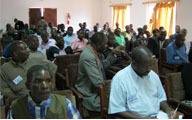
The USAID-funded Wellness and Agriculture for Life Advancement (WALA) was a five-year integrated food security program in Malawi that engaged farmers in commercial marketing to improve household incomes and, ultimately, food security. ACDI/VOCA worked with a consortium of NGOs, led by Catholic Relief Services, to reach 214,974 chronically food-insecure households within eight districts in southern Malawi. As the lead technical partner for agribusiness, ACDI/VOCA provided support to the project’s seven implementing partners in three key areas:
- Value chain analysis and implementation
- Building capacity of farmers to integrate into profitable value chains
- Linking smallholder farmers and private sector service providers
Value Chain Analysis and Implementation
ACDI/VOCA experts trained project staff and government partners in market opportunity identification strategies who in turn build the capacity of farmer groups to link to profitable markets. WALA identified and engaged farmers in market opportunities for production and marketing of bird’s eye chilies, pigeon peas, sesame, cassava and red sorghum, among other commodities.
Building Capacity of Farmers to Integrate into Profitable Value Chains
ACDI/VOCA project staff provided technical leadership in developing and implementing methodologies to help farmers organize so they could link to profitable markets. ACDI/VOCA led the agribusiness team in facilitating the formation of 253 marketing clusters (associations) and bringing together 26,377 farmers, 68 percent of whom are women. Through the marketing clusters, farmers accessed training and technical support, collective marketing and improved production of targeted cash crops.
Linking Smallholder Farmers to the Private Sector
Since 2011, ACDI/VOCA has been at the forefront of organizing smallholder farmer marketing fairs which bring smallholder farmers and private sector service providers together. Through the fairs, farmers explore and negotiate opportunities to market their crops and buy inputs at a discount price. Business service providers including financial institutions, market information providers and agriculture extension agencies utilize the fairs as a platform to market their products. In 2011, WALA-supported farmers sold over MK34 million (about U.S. $226,000) worth of commodities through marketing groups. The value of sales has more than tripled in 2012 reaching over MK100 million, including MK64 million worth of bird’s eye chilies sold through an outgrower program championed through the fairs.
The fairs have enabled farmers to access higher value markets, including selling to the World Food Program (WFP), through a contract arrangement facilitated by Agriculture Commodity Exchange (ACE). ACDI/VOCA was instrumental in mobilizing private sector sponsorship for the marketing fairs and will continue to lead efforts to sustain the events and business relationships established. By connecting farmers and other stakeholders within targeted value chains, ACDI/VOCA helps vulnerable households benefit from new market opportunities.
Food Insecurity in Malawi
An estimated 90 percent of Malawi’s population depends on agriculture. The vast majority of rural households are farmers who cultivate less than one hectare of land and rely heavily on adequate rains. Although Malawi has made significant gains in improving agricultural productivity over the last few years, 40 percent of the population still lives on less than $1 per day.
ACDI/VOCA Experience in Malawi
ACDI/VOCA has a long and successful history in Malawi. Starting in the 1980s, ACDI/VOCA implemented a series of USAID-funded projects that led to the formation of the National Smallholder Farmers’ Association of Malawi (NASFAM).





